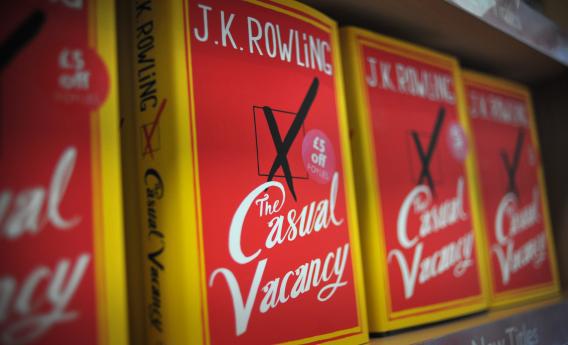J.K. Rowling’s new novel aimed at adult readers, The Casual Vacancy, arrives today. We already learned from the New Yorker that the novel is, in fact, pretty adult, but is it any good? We’ve scanned the reviews to get a sense of the early word.
The bottom line: If you want to hold onto your high hopes for a little longer, maybe just stop reading now. Sorry.
For those still reading: Most reviewers so far have either damned the book with faint praise or just, well, damned the book. At the New York Times, Michiko Kakutani allows that the “novel contains moments of genuine drama and flashes here and there of humor.” She then concludes: “There is no magic in this book—in terms of wizarding or in terms of narrative sorcery.” In fact, she says, The Casual Vacancy stirs up “whatever is the opposite of the emotions evoked” by the Harry Potter series: a “dismaying sense of human weakness, selfishness and gossipy stupidity,” rather than admiration for people’s “courage, perseverance, loyalty and … duty.”
So, not very uplifting. But does that mean the book is bad?
It’s as though writing about the real world inhibited Ms. Rowling’s miraculously inventive imagination, and in depriving her of the tension between the mundane and the marvelous constrained her ability to create a two-, never mind three-dimensional tale.
This strikes me as a fascinating—and devastating—insight. Writers need imagination not just to dream up fantastic creatures but to realize scenes and project themselves into characters. But Kakutani suggests that all of Rowling’s creativity flows from a single spigot: Delete the hippogriffs, and you’re left with cardboard cutouts of people navigating a “toy village.”
In the New York Daily News, Sherryl Connelly echoes this sense of diminishment. “J.K. Rowling has gone from Potter to potty-mouth,” she says, before announcing the new book “isn’t dreadful. It’s just dull.” The prose feels joyless, shot through with a strangely belligerent realism. Perhaps it’s something to do with the choice of protagonists: “All the characters are fairly horrible or suicidally miserable or dead,” reports Theo Talt in the Guardian. In the LA Times, David Ulin sees something mean-spirited about this. “Rowling … is casually cruel to her characters,” he says, “giving them problems they can’t surmount and then turning their lives from bad to worse, like John Irving in overdrive.” The town of Pagford, he adds, “is little more than a backdrop, a stage set, its lack of depth an emblem of Rowling’s inability to engage us, to invest us sufficiently in her characters, young or otherwise, to reckon with the contrivances of her fictional world.”
But! Sentences in The Casual Vacancy made the Washington Post’s Monica Hesse underline them “for the sheer purpose of figuring out how English words could be combined so delightfully.” Her review ascribes to the novel “certain charms,” at least, and praises Rowling’s “nimble voice and the quick way she manage[s] to get inside a character’s head and simultaneously comment on its contents.” Entertainment Weekly agrees, declaring that “Rowling does a nice job laying out her 20-plus characters’ endless pretensions and weaknesses, which she punctures with gleeful flicks of a surprisingly sharp comic blade.” People says she “captures the humanity in everyone.”
Finally, Andrew Losowsky at The Huffington Post splits the difference. “Though some sequences feel a few drafts short of being ready,” he says, “others are written with a fluency and beauty that suggest that there could be more and better works to come from [Rowling’s] pen.”
So what should we make of this mixed bag of criticism? I’ll probably read the book, even if I should be reading the new Zadie Smith instead. And I still expect to find glimmers of the old Rowling: her wit, lightness, and eye for human folly. But where Harry Potter crammed the small-minded, banal doings of Uncle Vernon and Aunt Petunia next to mythic Manichean struggles, it sounds like The Casual Vacancy is pure, unadulterated Muggle.
Which may just be Rowling’s way of informing everyone that it’s time to grow up. Ding dong, and farewell: The witches (and wizards) are dead.
Previously:
Harry Potter and the “Miraculously Unguarded Vagina”
Will J.K. Rowling’s Novel for Adults Be Any Good?
